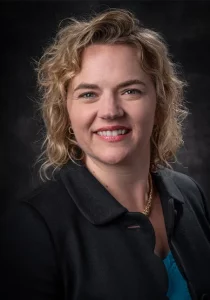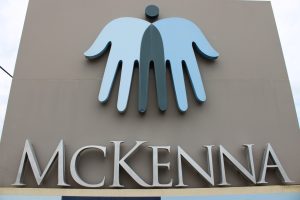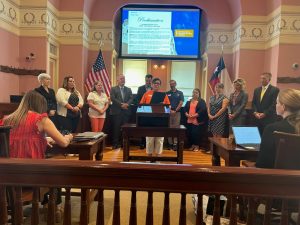
August 31, 2023
The beginnings of an organization that would become the McKenna Foundation go back more than 70 years to a time when industry was emerging in what was a farm and ranch community and population growth prompted the need for a full-service hospital.
Two attempts in the late 1940s to establish a county-funded hospital in New Braunfels narrowly failed, but a group of business and civic leaders led by Howard McKenna didn’t give up on that vision.
The group set out to privately secure the funds to build a new hospital. Along with a host of peers, McKenna persuaded the city in 1951 to support health care for its residents by providing a site for the proposed Hospital. The city leaders and other individuals organized a fundraising effort in 1952, often going door to door to ask residents for their support.
The effort was worth it, and the vision became a reality. New Braunfelsers donated more than $500,000 for the project, equivalent to nearly $5.9 million in today’s dollars, augmented by a $280,000 Hill-Burton grant.
Construction began in October 1952, and a grand opening celebration for the new 40-bed New Braunfels Hospital took place about a year later. The original structure, which still stands as the central core of the Hospital, opened its doors to patients in November 1953.
In 1973, New Braunfels Hospital changed its name to McKenna Memorial Hospital in honor of Howard McKenna, who served as president of the Hospital’s board of trustees for more than 20 years.
The following decades brought tremendous growth to the Hospital, including several multimillion-dollar facilities and equipment expansions. What began as a small community hospital grew into a nationally recognized regional healthcare provider. The McKenna Health System found its place as a vital part of New Braunfels and Comal County, providing effective programs, services and resources benefiting the health and well-being of the community.
The hospital operated as an independent facility until 2008 when the board opted to sell McKenna Memorial Hospital to a system with resources that could expand the service line to the growing area. The sale to CHRISTUS Santa Rosa Health Care took place on January 31st of that year.
The hospital sale brought two significant benefits to the New Braunfels community: the assurance of quality health care by CHRISTUS and providing the funding to create the McKenna Foundation, whose mission is to advance the well-being of the greater New Braunfels community.
The foundation began making grants to community nonprofits in 2009 and has since awarded more than 500 grants to 85 nonprofit organizations serving local residents. Over 15 years, more than $28 million in grant funding has resulted in strengthened and new programs and nonprofit assets that bolster the strained social infrastructure of this growing community.
The foundation also continues to oversee the McKenna Events Center and the Children’s Museum which opened on April 1, 2006. Since that time, those offerings remained a community need through which McKenna has served thousands of residents as a community partner.
In the coming months, we will highlight key funding areas and projects that have come to define McKenna’s role as an advocate for those in need. Above all, the McKenna Foundation seeks to listen, learn, and love on the community with whom their journey began 70 years ago.
The community spirit first demonstrated by Howard McKenna continues to be embodied by his namesake organization that he never knew would carry on the legacy of his life’s work. Thousands in this community, including many of you, have been part of this work as hospital and foundation staff, volunteers, donors, board members and nonprofit partners. This makes us all part of the McKenna family.
Alice Jewell is the Chief Executive Officer for the McKenna Foundation whose mission is to advance the well-being of the New Braunfels community. She has been with the Foundation since its inception in 2008, and with the McKenna organization since 2006. Prior to this role, Alice served as the Foundation’s Executive Director, Director of McKenna Children’s Museum and Director of McKenna Events Center. She oversees all aspects of the grant development process, as well as the Foundation’s strategic planning and community collaborations. Alice received a BA in Communication from the University of Texas at Austin and a Master of Public Service and Administration from the Bush School of Government and Public Service at Texas A&M University.








